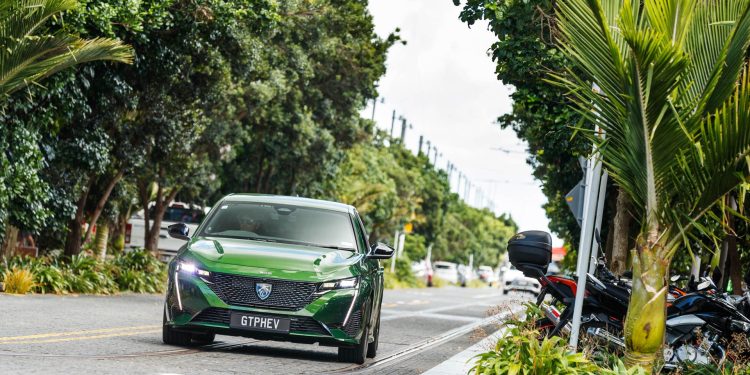2023 Peugeot 308 GT PHEV review
Words: Kyle Cassidy | Photos: Tom Gasnier
Peugeot’s 308 introduces us to a new Lion badge, and yet another rebranding for the French maker, one that promises more ‘premiumness’. The GT PHEV is the latest addition to the range.
The local Peugeot 308 range is now a trio with the arrival of the hybrid. It’s a plug-in variant so with its 12kWh battery and an 81kW motor, there’s the potential for 61km of emissions-free travel, with the emphasis on ‘potential’. The engine/motor/battery trio mean it’s pricey at $74,990, although being a plug-in hybrid you get a $5750 rebate. Still that’s $70K, a lot of coin for a hatchback.
This marks another ‘rebirth’ for the French brand, and not the first time this manufacturer has pledged to up its game in terms of premium quality. The 308 is based on the EMP2 platform which is now on its third revision. The hatch retains its familiar silhouette but is layered with a new design language and styling features, the most prominent being the front end with its new grille and that reimagined lion badge.
This evaluation unit wears the new hero colour ‘Olivine Green’ which, judging by the public’s reaction, is quite popular. It’s one of those hues that changes character depending on the light. It’s certainly a premium finish, and the only paint colour that is included in the price; the other five are $550-$950 cost options.
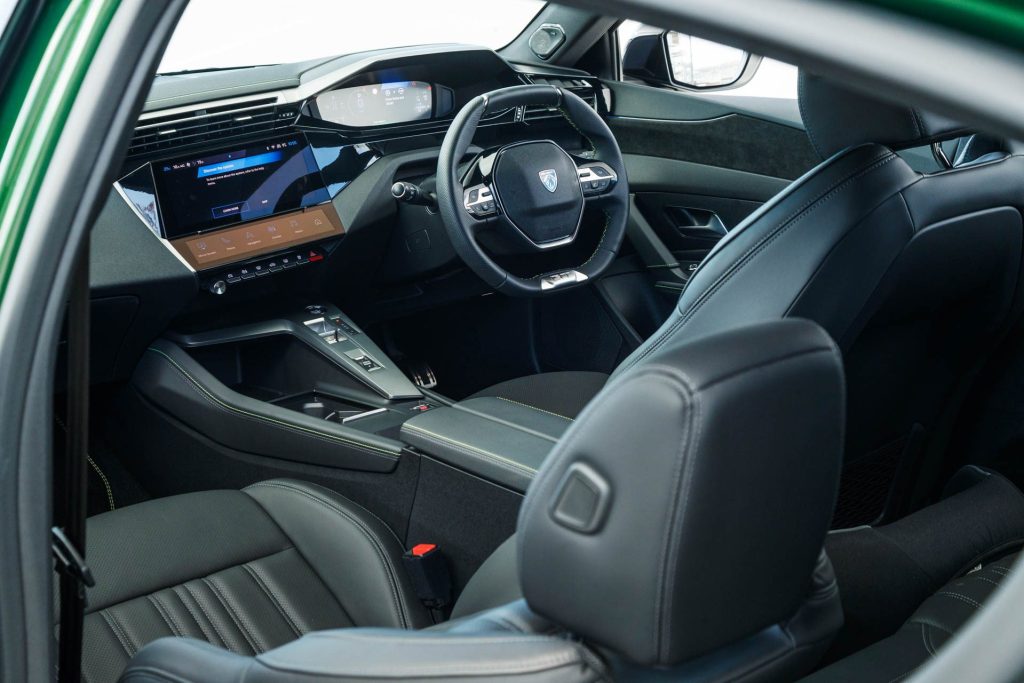
Is the Peugeot 308 GT PHEV a premium car?
It’s inside where you get a better idea of Peugeot’s premium intent. While our unit was packing the $5k GT Premium pack (better seats with heating and massage functions, Nappa leather, the Focal stereo, and swisher alloys) most of the interior surfaces of this 308 ace the prod test, the plastics reserved for the lower part of the cabin.
The premium seats are worthy, with massaging functions and great adjustment for a fine fit; you’re ensconced nicely but not restricted.
Along with more ‘premium’ finishing, it’s good to see lined storage spots, half decent cup holders and a proper glove box, one that’s not taken up with the fuse box as it has been for the past couple of decades. We like the small toggle switch gear lever but is it too far forward on the console?
Peugeot’s donut wheel returns, set low with the main dials above, which are configurable with different displays and all the info contained neatly within.
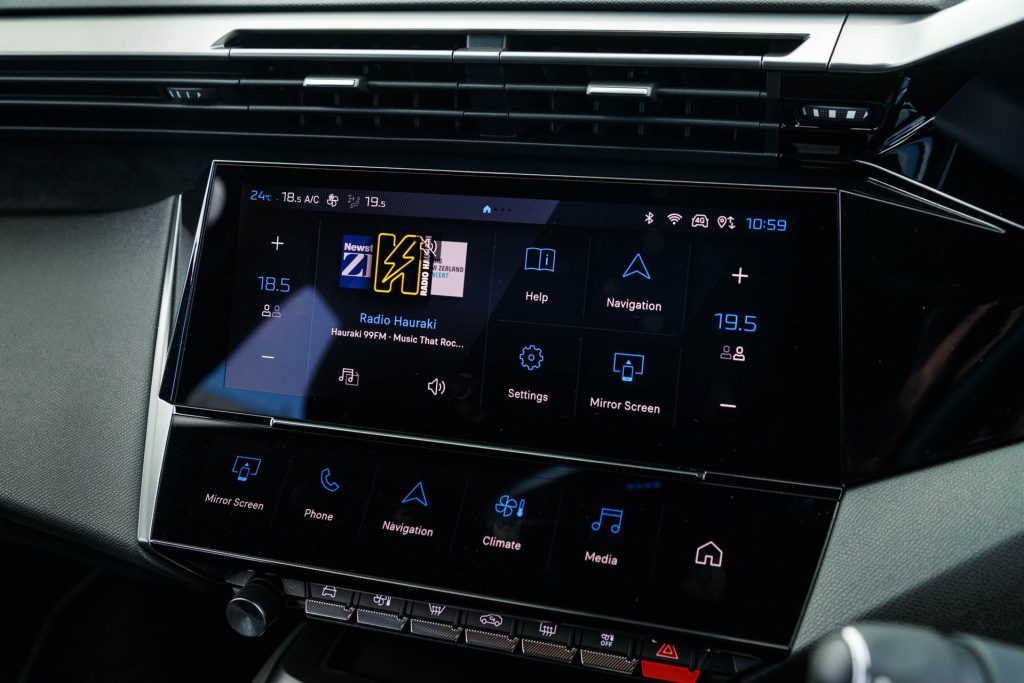
The infotainment system has been revitalised with a bigger screen, seemingly infinite customisation (is all of it necessary?) and more connected features. It’s appealing to the eye, the reversing camera images are particularly bright, almost like it’s compensating for the poor quality versions in the past.
The voice control has limited applications but the system’s touch sensitivity and response times are good. While there’s lots to set up and sort out (along with a constant system tuition prompt on start-up), there are few of those usual French nuances about it.
Is the 308 GT PHEV a good urban car?
It’s a compact hybrid hatch, so yes, it works best in urban environs. The ride quality is sorted, some might think it a tad firm at first but we say nicely controlled, the damping well tuned. There is some tyre rumble on coarser surfaces, especially when in the electric, aka silent, drive mode.
This has a good turn around, the steering’s light and the small wheel is easy to twirl. Dimensionally compact, it’s easy to park as well.
The flip side is interior space. Those up front have it sweet but rear passengers do it tough for leg room while the rear doors are small too. Open the boot and there’s probably enough luggage space for the typical buyer but it’s not class leading.
The boot floor is set high with no spare beneath it, just a repair kit. However folding the rear seat gives a reasonably level extended load space.
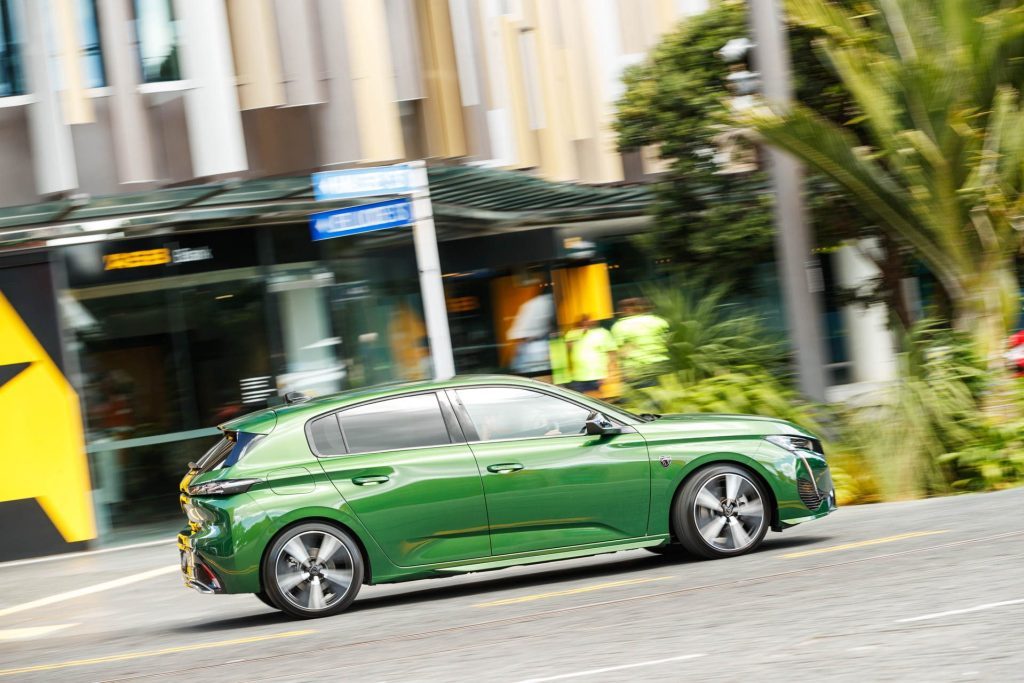
So does this Peugeot deliver low emissions driving?
There are a few drive modes, one being electric which is the one to choose in urban running so as to minimise your fuel use. The motor operates via the eight-speed transmission, so feels stronger than its 81 kilowatt output suggests. It’s smooth too, the shifts going largely undetected thanks to the motor’s flat torque curve.
We managed to average around 45km of travel on battery power, while recharges sucks up 11.5kWh of energy, charged overnight easily enough on the supplied three-pin plug. But at 25.5kWh/100km, it’s not what you’d call an efficient EV.
In hybrid mode, it decides which is the better motivator to use. For instance during motorway or highway running, the engine can be the better option.
And once the battery is down to its minimum, you’re relying mainly on the 132kW/250Nm 1.6-litre turbo-petrol, with the motor helping out.
It’s still capable of some engine-off running, while progress remains rather torquey, if not quite as smooth or quiet as in the Electric mode.
The more kilometres you do without recharging the higher the fuel consumption; figure on something between 4.5 and 5.0L/100km. While that’s not bad, there are cheaper conventional hybrid options out there.
The fuel consumption claim for the 308 PHEV is 1.0L/100km. Blame the WLTP test procedure; it runs for just 30min over a distance of 23km. You’d have thought a 100km test cycle would be more relevant.
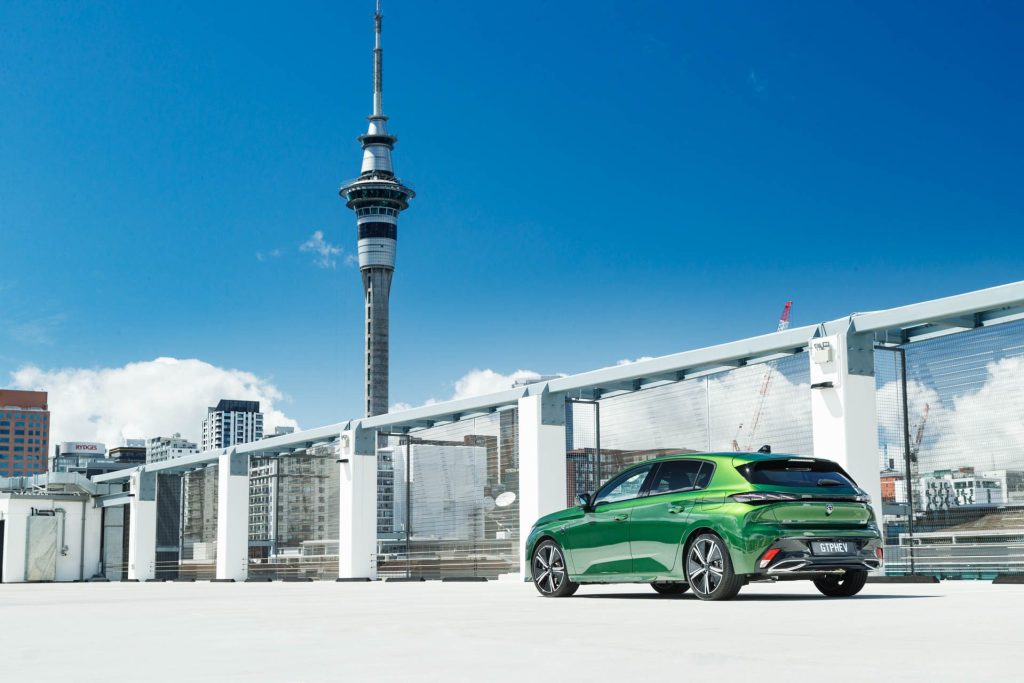
Does it live up to its GT badging?
If you find yourself on a half decent road, select Sport mode and you get a better response from the powertrain, the transmission shifting with more intent and the engine working harder. It’s quick enough but not a powerhouse. While the 165kW system output sounds impressive, the 1633kg weight figure dulls the gloss.
Still it’s quicker than the 1.2 GT and the electric bits don’t diminish the 308’s playful chassis character. The steering’s light but communicates well and the action is accurate. The front end is particularly feisty, digging in determinedly while the rear end can be made to move about too.
And the suspension still has a good degree of give but also keeps roll contained. It’s an enjoyable thing to fling about.
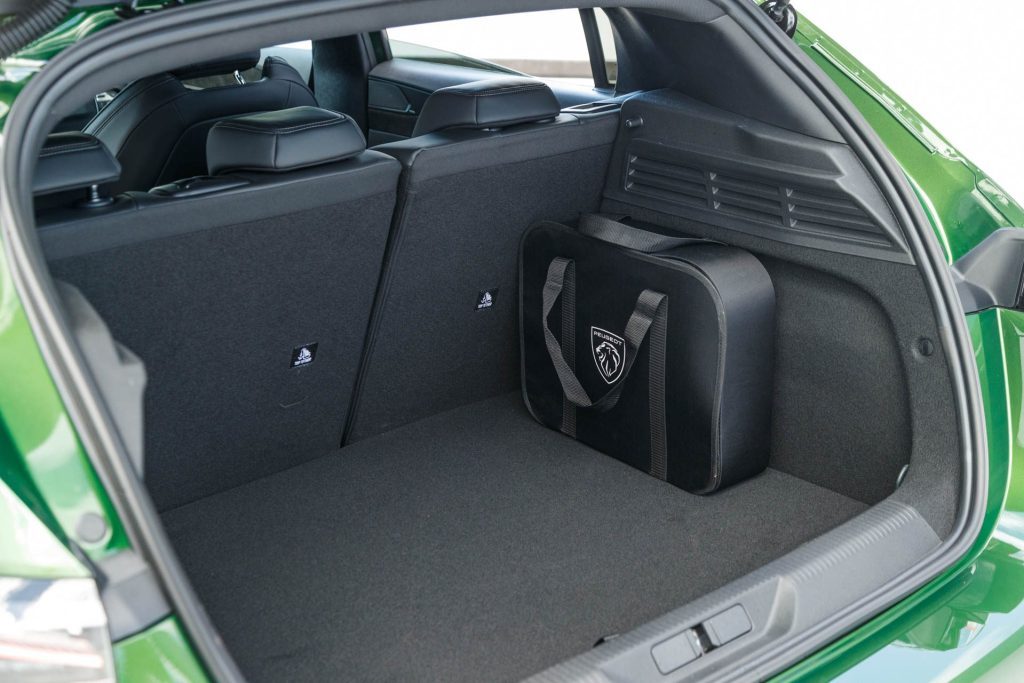
Worth the premium though?
While this is a thoroughly decent car, the price is the sticking point. Plug-in hybrids are inbetweeners, and this one’s stuck in electric purgatory.
We’d probably wait for the 308e coming at the end of the year which is unlikely (well, hopefully) to be much more expensive, or else we’d opt for the regular GT, some $20k cheaper.
| Model | Peugeot 308 GT PHEV |
| Price | $74,990 |
| Clean Car Discount | Rebate – $5,750 |
| Engine | 1598cc, IL4, T, DI |
| Power/Torque | 132kW @ 6000rpm |
| Torque | 250Nm @ 1750rpm |
| Hybrid System Output | 165kW/360Nm |
| Battery | 12.4kWh net |
| Turning Circle | 11.3m (3.0 wheel turns) |
| Drivetrain | 8-speed automatic, FWD |
| Fuel Use | 1.0L/100km |
| C02 Output | 50g/km |
| 0-100km/h | 7.21sec |
| 80-120km/h | 4.23sec (121m) |
| 100-0km/h | 36.7m |
| Stability systems | ABS, ESP, TV |
| Safety | AEB, ACC, BSM, LDW, RCTA, ALK, AHB |
| Luggage capacity | 361-1271L |
| Tow rating | 600kg (1500kg braked) |
| Service intervals | 12 months/15,000km |
| Scheduled servicing | 3yrs/45,000km |
| Warranty | 5yrs, 100,00 km |
| ANCAP rating | 4 stars (2022) |
| Weight | 1633kg (claimed) |


